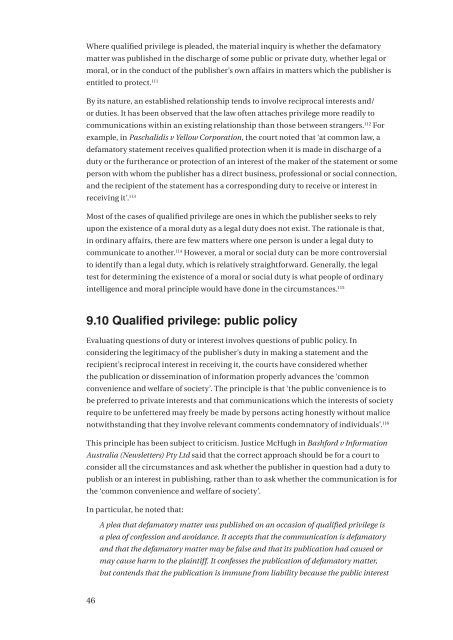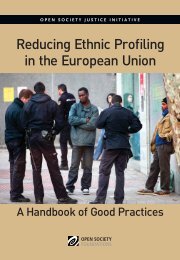Responding to the financial abuse of older people - Loddon ...
Responding to the financial abuse of older people - Loddon ...
Responding to the financial abuse of older people - Loddon ...
- No tags were found...
You also want an ePaper? Increase the reach of your titles
YUMPU automatically turns print PDFs into web optimized ePapers that Google loves.
Where qualified privilege is pleaded, <strong>the</strong> material inquiry is whe<strong>the</strong>r <strong>the</strong> defama<strong>to</strong>ry<br />
matter was published in <strong>the</strong> discharge <strong>of</strong> some public or private duty, whe<strong>the</strong>r legal or<br />
moral, or in <strong>the</strong> conduct <strong>of</strong> <strong>the</strong> publisher’s own affairs in matters which <strong>the</strong> publisher is<br />
entitled <strong>to</strong> protect. 111<br />
By its nature, an established relationship tends <strong>to</strong> involve reciprocal interests and/<br />
or duties. It has been observed that <strong>the</strong> law <strong>of</strong>ten attaches privilege more readily <strong>to</strong><br />
communications within an existing relationship than those between strangers. 112 For<br />
example, in Paschalidis v Yellow Corporation, <strong>the</strong> court noted that ‘at common law, a<br />
defama<strong>to</strong>ry statement receives qualified protection when it is made in discharge <strong>of</strong> a<br />
duty or <strong>the</strong> fur<strong>the</strong>rance or protection <strong>of</strong> an interest <strong>of</strong> <strong>the</strong> maker <strong>of</strong> <strong>the</strong> statement or some<br />
person with whom <strong>the</strong> publisher has a direct business, pr<strong>of</strong>essional or social connection,<br />
and <strong>the</strong> recipient <strong>of</strong> <strong>the</strong> statement has a corresponding duty <strong>to</strong> receive or interest in<br />
receiving it’. 113<br />
Most <strong>of</strong> <strong>the</strong> cases <strong>of</strong> qualified privilege are ones in which <strong>the</strong> publisher seeks <strong>to</strong> rely<br />
upon <strong>the</strong> existence <strong>of</strong> a moral duty as a legal duty does not exist. The rationale is that,<br />
in ordinary affairs, <strong>the</strong>re are few matters where one person is under a legal duty <strong>to</strong><br />
communicate <strong>to</strong> ano<strong>the</strong>r. 114 However, a moral or social duty can be more controversial<br />
<strong>to</strong> identify than a legal duty, which is relatively straightforward. Generally, <strong>the</strong> legal<br />
test for determining <strong>the</strong> existence <strong>of</strong> a moral or social duty is what <strong>people</strong> <strong>of</strong> ordinary<br />
intelligence and moral principle would have done in <strong>the</strong> circumstances. 115<br />
9.10 Qualified privilege: public policy<br />
Evaluating questions <strong>of</strong> duty or interest involves questions <strong>of</strong> public policy. In<br />
considering <strong>the</strong> legitimacy <strong>of</strong> <strong>the</strong> publisher’s duty in making a statement and <strong>the</strong><br />
recipient’s reciprocal interest in receiving it, <strong>the</strong> courts have considered whe<strong>the</strong>r<br />
<strong>the</strong> publication or dissemination <strong>of</strong> information properly advances <strong>the</strong> ‘common<br />
convenience and welfare <strong>of</strong> society’. The principle is that ‘<strong>the</strong> public convenience is <strong>to</strong><br />
be preferred <strong>to</strong> private interests and that communications which <strong>the</strong> interests <strong>of</strong> society<br />
require <strong>to</strong> be unfettered may freely be made by persons acting honestly without malice<br />
notwithstanding that <strong>the</strong>y involve relevant comments condemna<strong>to</strong>ry <strong>of</strong> individuals’. 116<br />
This principle has been subject <strong>to</strong> criticism. Justice McHugh in Bashford v Information<br />
Australia (Newsletters) Pty Ltd said that <strong>the</strong> correct approach should be for a court <strong>to</strong><br />
consider all <strong>the</strong> circumstances and ask whe<strong>the</strong>r <strong>the</strong> publisher in question had a duty <strong>to</strong><br />
publish or an interest in publishing, ra<strong>the</strong>r than <strong>to</strong> ask whe<strong>the</strong>r <strong>the</strong> communication is for<br />
<strong>the</strong> ‘common convenience and welfare <strong>of</strong> society’.<br />
In particular, he noted that:<br />
A plea that defama<strong>to</strong>ry matter was published on an occasion <strong>of</strong> qualified privilege is<br />
a plea <strong>of</strong> confession and avoidance. It accepts that <strong>the</strong> communication is defama<strong>to</strong>ry<br />
and that <strong>the</strong> defama<strong>to</strong>ry matter may be false and that its publication had caused or<br />
may cause harm <strong>to</strong> <strong>the</strong> plaintiff. It confesses <strong>the</strong> publication <strong>of</strong> defama<strong>to</strong>ry matter,<br />
but contends that <strong>the</strong> publication is immune from liability because <strong>the</strong> public interest<br />
46
















